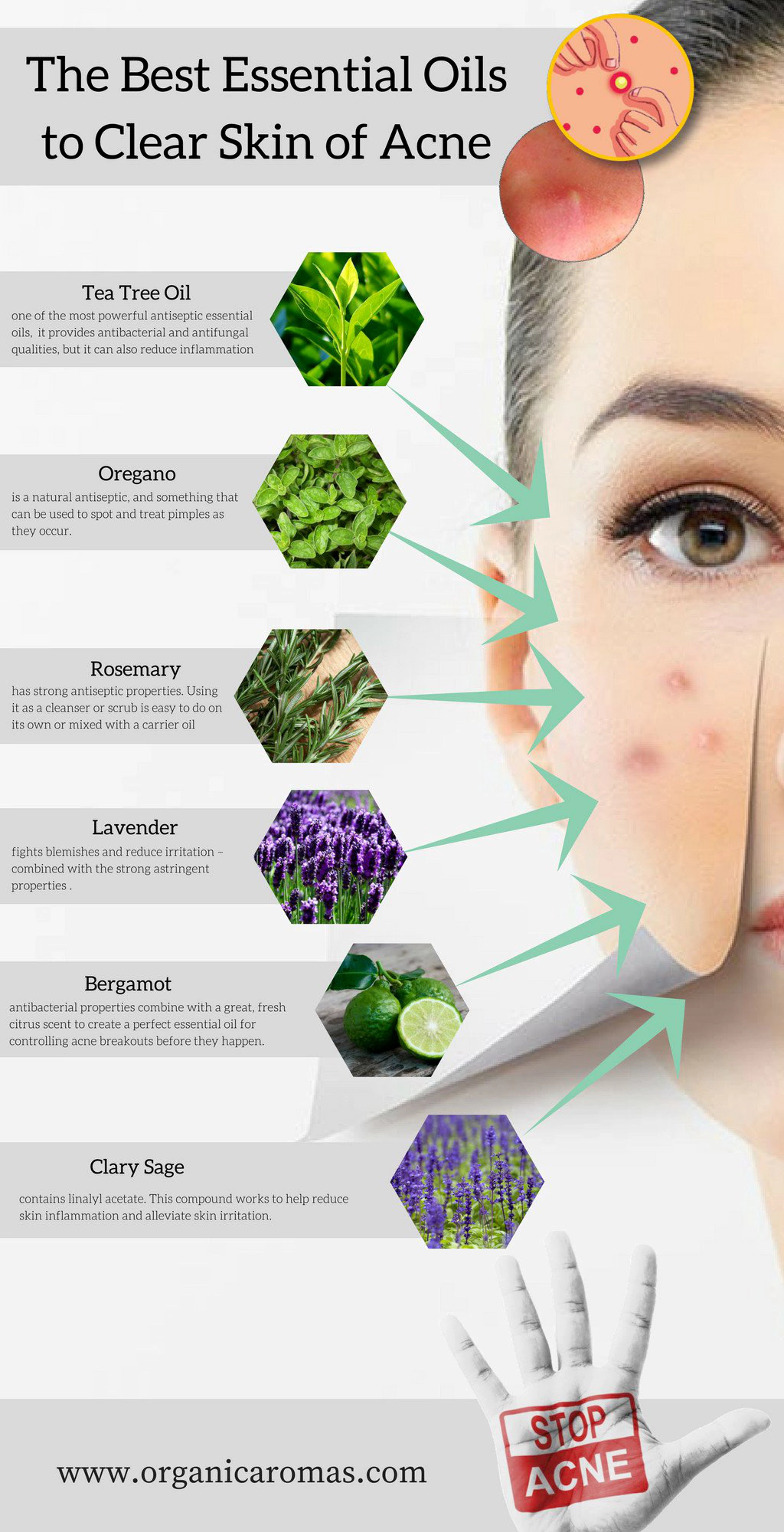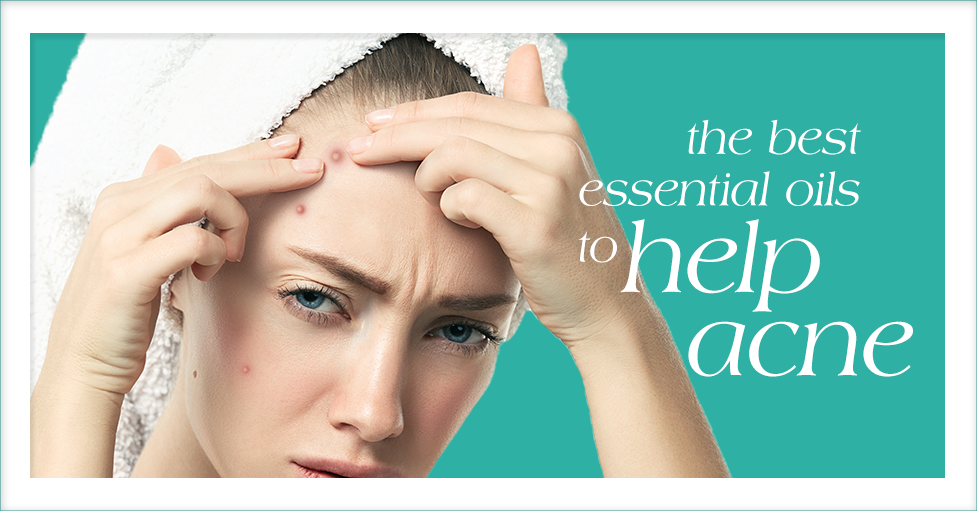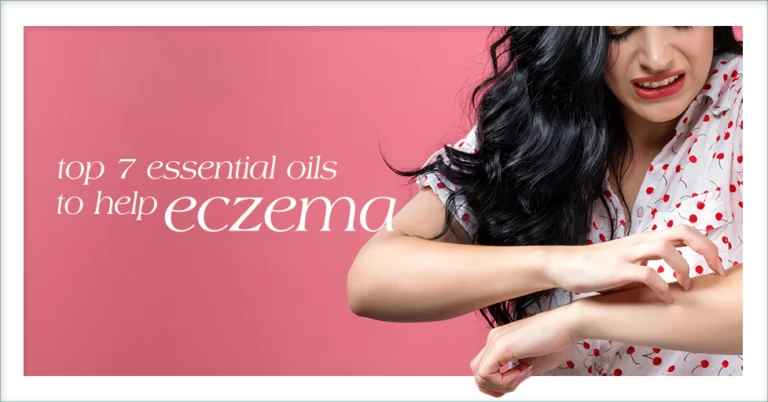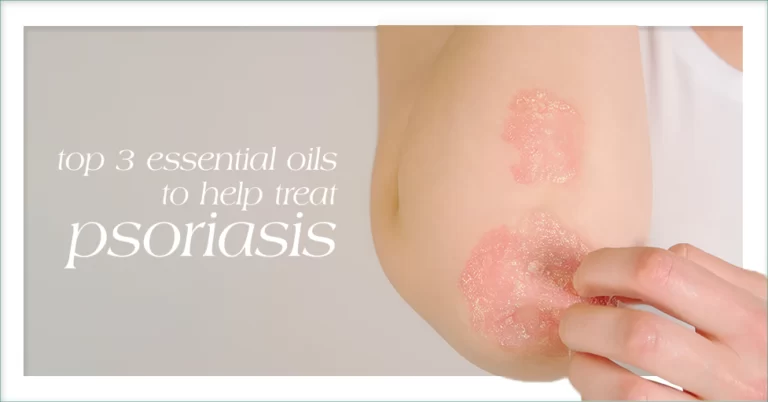The Best Essential Oils to Help With Acne
Last update: May 9, 2023
What is Acne?
Acne is one of the most common skin conditions out there, affecting roughly 70 to 90 percent of all young adults and plenty more older Americans as well. While acne itself isn’t life-threatening, it can be life changing. Acne can create low self-esteem, low confidence, image issues, and more. As such, fighting acne before it is important.
Symptoms and Causes of Acne
Acne is a common skin condition that occurs when hair follicles become clogged with oil and dead skin cells. It’s most commonly seen in teenagers but can affect people of all ages. Acne can manifest in various forms, including blackheads, whiteheads, pimples, cysts, and nodules.
Symptoms of Acne
The symptoms of acne can vary depending on the severity and type of acne. Here are some common symptoms associated with acne:
-
Whiteheads: These are closed, clogged pores that appear as small, raised, white bumps on the skin’s surface.
-
Blackheads: These are open, clogged pores that have oxidized, causing the debris inside to turn black or dark brown.
-
Papules: These are small, raised, red bumps that may feel tender to the touch. They occur when the hair follicle wall breaks down due to inflammation.
-
Pustules: These are pus-filled, inflamed lesions that can be red and tender. They typically form when bacteria become trapped in the hair follicle.
-
Nodules: These are larger, painful lumps that form beneath the skin’s surface. Nodules occur when plugged pores experience further irritation and inflammation, causing the affected follicles to expand.
-
Cysts: These are large, pus-filled lumps that are often painful and can cause scarring. Cysts result from severe inflammation and infection deep within the hair follicle.
Causes of Acne
Acne is a complex skin condition that can be caused by several factors, including:
-
Excess oil production: Overactive sebaceous glands can produce too much oil (sebum), which can clog pores and lead to acne prone skin.
-
Dead skin cells: When the cells aren’t shed effectively, they can accumulate in the hair follicle and contribute to build-up in the pores.
-
Bacteria: The bacterium Propionibacterium acnes (P. acnes) is a natural inhabitant of the skin. However, when trapped inside a clogged pore, it can multiply and cause inflammation, leading to acne.
-
Inflammation: Inflammation is a natural response to infection, injury, or irritation. In the case of acne, inflammation can cause redness, swelling, and pain associated with the affected areas.
-
Hormonal fluctuations: Hormonal changes, especially during puberty, menstruation, and pregnancy, can cause an increase in sebum production, leading to acne. Androgens, male hormones present in both men and women, can contribute to this increase in sebum production.
-
Genetics: A family history of acne can predispose an individual to developing the condition.
-
Diet: Some studies suggest a link between certain dietary factors, such as a high glycemic index or dairy consumption, and acne. However, more research is needed to establish a definitive connection.
Understanding the symptoms and causes of acne is essential for finding the right treatment options. While some people may find relief from over-the-counter treatments or natural remedies like essential oils, others may require prescription medications or even medical procedures to manage their acne effectively. It’s crucial to consult with a healthcare professional or dermatologist if you have concerns about your acne or if it’s not responding to treatment.
Natural Remedies vs Prescription Medications
Prescription medications for acne, such as retinoids and antibiotics, can be effective but often come with potential side effects, like dryness, irritation, and sun sensitivity. On the other hand, natural remedies like essential oils for acne offer a gentler alternative. They can provide similar benefits but typically with fewer side effects.
However, the results from essential oils might take longer to appear, and they may not work for everyone. If your acne is severe or persistent, it’s recommended to consult a dermatologist.
The Best Essential Oils to Help with Acne
Essential oils can provide a natural, effective method for managing acne. These oils offer a variety of benefits, from anti-inflammatory and antibacterial properties to the promotion of skin healing and the reduction of sebum production. Here’s a closer look at several essential oils for acne that can be particularly beneficial.

It’s crucial to remember that not all skin is the same. Therefore, what works for one person might not work for another. Here’s a deeper look into the considerations for using essential oils for different skin types:
Essential Oils for Dry Skin
Dry skin lacks moisture and can often appear flaky or rough. It’s essential to nourish and hydrate this skin type, so when choosing essential oils for acne, opt for those that provide these benefits.
Sandalwood Essential Oil
This oil is known for its moisturizing properties and its ability to restore the skin’s natural oil balance. It’s a good choice for dry skin as it can help smooth and hydrate without causing irritation.
Chamomile Essential Oil
Chamomile oil has powerful anti-inflammatory properties that can soothe dry, irritated skin. It also helps to restore moisture and promote a healthy skin glow.
Essential Oils for Oily Skin
Oily skin overproduces sebum, which can lead to shiny skin and often more acne. Therefore, the goal when selecting essential oils for oily skin is to balance oil production without stripping the skin of its natural oils.
Tea Tree Essential Oil
This is one of the most powerful antiseptic essential oils out there. Not only does it provide antibacterial and anti-fungal qualities, but it can also reduce inflammation. Using it by simply adding a few drops to a carrier oil like coconut oil or almond oil and wipe acne flare-ups as you feel them occurring.
Oregano Essential Oil
Oregano is great for more than just seasoning food. It’s also something that is a natural antiseptic, and something that can be used to spot and treat acne and pimples as they occur. To use, dilute with equal parts oregano oil and a carrier oil like coconut or almond oil. Dab the mixture onto the spot as needed.
Rosemary Essential Oil
Rosemary is another kitchen staple that has strong antiseptic properties in its essential oil form. Using it as a cleanser or scrub is easy to do on its own or mixed with a carrier oil, and it can help to eliminate oily residues on the face while also helping to ease the redness and tenderness that comes from acne flare-ups.
Essential Oils for Sensitive Skin
Sensitive skin can easily react to products, resulting in redness, irritation, or discomfort. The best essential and carrier oils are those with soothing properties.
For sensitive skin, always perform a patch test before using a new essential oil. Also, consider diluting essential oils in a gentle carrier oil like calendula oil, known for its soothing, anti-inflammatory properties, or apricot kernel oil, which is light and easily absorbed.
Lavender Essential Oil
Lavender finds its way into a huge assortment of home remedies, and its ability to fight blemishes and reduce irritation on the skin – combined with the strong astringent properties – means that it’s a great choice for those looking to fight acne. Mix lavender essential oil with jojoba and almond oil and you have a great essential oil skin care and acne treatment, that works as a moisturizer and a cleanser.
Clary Sage Essential Oil
Clary sage contains linalyl acetate. This compound works to help reduce skin inflammation and alleviate skin irritation. It’s highly effective and has actually been studied extensively for a variety of things – including lowering cortisol levels and reducing the spread of bacteria.
Each of these options is a great choice for those who are looking to combat acne. However, it’s important to remember that results don’t come overnight in all instances. It’s best to set up a preventative regimen to keep the skin clean and free from oil and contaminants with something like lavender, then using one of the spot-treatment oils to deal with the acne problem areas that appear even with the treatment.
Three Must Try Essential Oil Recipes for Acne
1. Tea Tree Oil Spot Treatment
This simple spot treatment is perfect for targeting individual pimples.
Ingredients:
-
1 tablespoon of jojoba oil (carrier oil)
-
2-3 drops of tea tree essential oil
Instructions:
-
Mix the tea tree oil with the jojoba oil in a small, dark glass bottle.
-
After cleansing your face, apply a small amount of the mixture directly to the acne spots using a clean cotton swab.
-
Leave it on overnight or rinse off after a few hours.
2. Lavender Oil Acne-Fighting Face Serum
This recipe creates a soothing face serum that can be used daily.
Ingredients:
-
2 tablespoons of grapeseed oil (carrier oil)
-
4 drops of lavender essential oil
-
2 drops of frankincense essential oil
Instructions:
-
Combine all the oils in a small, dark glass bottle.
-
Cleanse your face and pat dry.
-
Apply 2-3 drops of the serum to your face, avoiding the eye area, and massage gently into your skin.
3. Acne-Fighting Facial Steam
A facial steam helps to open up the pores, allowing the essential oils to penetrate deeper into the skin.
Ingredients:
-
4 cups of boiling water
-
2 drops of clary sage essential oil
-
2 drops of chamomile essential oil
Instructions:
-
Pour boiling water into a large, heat-safe bowl.
-
Add the essential oils to the water.
-
Lean over the bowl, keeping your face about 10 inches away from the water. Drape a towel over your head to create a tent that keeps the steam in.
-
Close your eyes and breathe deeply, allowing the steam to penetrate your skin for 5-10 minutes.
-
Follow with a gentle cleanser, then moisturize as usual.
Essential Oils and Reducing Visible Acne Scars
Acne scars can be a frustrating reminder of past skin troubles, and while it can be challenging to completely remove them without medical treatments, some essential oils may help reduce their appearance. These oils often promote skin regeneration, reduce inflammation, and provide antibacterial properties. A few essential oils that can help are; lavender essential oil, frankincense oil and rosemary essential oil.
Risks and Side Effects of Using Essential Oils for Acne
While essential oils are natural, they can still cause side effects. These can include allergic reactions, skin irritation, and photosensitivity. Always dilute essential oils with a carrier oil before applying to the skin, and never ingest essential oils without the advice of a healthcare professional.
Lesser-known Alternative Methods for Managing Acne
While essential oils and traditional treatments often take center stage in the fight against acne, there are several lesser-known but equally effective methods that can aid in managing this skin condition.
Dietary Changes
The link between diet and acne isn’t definitive, but certain foods may trigger or exacerbate acne in some people.
- Low-glycemic diet: Foods with a high glycemic index can cause a spike in blood sugar levels, leading to increased insulin levels. This can result in the overproduction of skin oils and increased inflammation, both of which can exacerbate acne. Opting for a low-glycemic diet, which includes foods like whole grains, most fruits, vegetables, nuts, and legumes, can help manage acne.
- Omega-3 fatty acids: Foods rich in Omega-3 fatty acids, such as fatty fish, walnuts, and flaxseeds, can help reduce inflammation and potentially reduce the severity of acne.
- Limit dairy and processed foods: Some research suggests that dairy, particularly skim milk, and processed foods may be linked to acne. Consider reducing intake of these to see if your skin condition improves.
Stress Management Techniques
Stress doesn’t cause acne, but it can exacerbate it. When you’re stressed, your body produces more androgens, a type of hormone that stimulates the oil glands and hair follicles in the skin, leading to acne. Stress management techniques can help not only in reducing acne but also improving overall health.
- Yoga and Meditation: These mind-body practices can help reduce stress levels. They promote relaxation and can, over time, lead to improvements in acne.
- Deep Breathing: Simple deep-breathing exercises can help calm the mind and reduce stress. Practicing deep breathing for a few minutes each day can be beneficial.
- Progressive Muscle Relaxation: This involves tensing and then relaxing each muscle group. It’s a simple technique that can promote relaxation and stress relief.
Regular Exercise
Regular exercise can improve blood circulation, leading to nourished skin cells and effective removal of waste products. It also helps reduce stress levels, potentially leading to a reduction in acne breakouts.
- Aerobic exercise: Activities like jogging, cycling, and swimming get your heart rate up and can decrease stress and balance hormones.
- Resistance training: Weightlifting or strength training can also help manage stress levels and balance hormones.
- Yoga and Pilates: Apart from stress reduction, these exercises also help improve blood circulation, benefiting skin health.
Remember, while exercising, it’s essential to keep your skin clean. Sweat can clog pores, so make sure to wash your face after a workout.
In conclusion, managing acne effectively often requires a holistic approach that includes not only topical treatments but also lifestyle modifications. While these alternative methods may be lesser-known, they can play a significant role in managing acne and improving overall skin health. Naturally, always be prudent, go slow and use these techniques in moderation. Test it out and proceed gradually to find that right system that fits you.
Popular Articles
[row] [col span=”4″ span__sm=”12″] [ux_image id=”55793″ link=”https://organicaromas.com/blogs/aromatherapy-and-essential-oils/the-best-essential-oils-for-dry-skin/”] [ux_text text_align=”center”]The Best Essential Oils For Dry Skin
[/ux_text] [/col] [col span=”4″ span__sm=”12″] [ux_image id=”43995″ link=”https://organicaromas.com/blogs/aromatherapy-and-essential-oils/top-4-essential-oils-to-prevent-wrinkles/”] [/col] [col span=”4″ span__sm=”12″] [ux_image id=”44062″ link=”https://organicaromas.com/blogs/aromatherapy-and-essential-oils/top-3-essential-oils-to-help-treat-psoriasis/”] [/col] [/row]



Very interesting.
Thanks for sharing your wonderful posts. You are doing amazing work! I’ve been using Retin-A (Tretinoin)+Moisturizer for about 3 years now. So happy I googled ‘My247reta’ and got retin-a ❤️. It is hands down the most effective anti-aging, anti-dark spot, anti-whatever skin flaw you may have. It’s also the only thing that has actually helped with my acne. People comment on my skin daily, and have for the past 3 years since I started using it.
Can I make a rollerball of all mixed together fir acne and just spot treat the acne?
This is so interesting. I love that Lavender is such a good one. We use it to fall asleep.
my favorite is tea oil if I have body blmiss that’s what ;i use
Can’t wait to try the diffuser!
Tea tree oil is great for acne and other skin conditions.
I don’t have a problem with acne but I do know people who do so this is a great article to share with them. It’s great to know that there are essential oils that can help with this problem. I would love to try this set of essential oils. I’ve heard great reviews about them. Thanks for sharing this information with us!
I don’t have acne, however I am aware that essential oils has many uses. I recently purchased a book about aromatherapy which has recipes and many explanations for usage, safety and storage. I am now addicted.
Im trying blending so I mixed the tea tree and rosemary that came in my kit to help with my skin issues. Hoping I see results
works like magic!
That’s will help me for sure .. ThanQ
Very informative as usual! Info about clary sage lowering cortisol was particularly useful.
I love the benefits of essential oils!
I already used tea tree for my daughter’s acne. Thanks for all the information on the other EO’s I can use!
Thank you for the information. I have a person in my family that I will pass this information on to, I know she will love the idea of using essential oils to keep her skin clear.
I am going to try this!
I’m going to try these!
My daughter has issues with breakouts from time to time and love the idea of essential oils to help!
New to essential oils. Love the idea of using organic material instead of chemicals to solve are skin problems.
Informative as always. I have an adult friend who had that issue but managed to clear it up by eliminating glueten + started using essential oils … not sure which ones though.